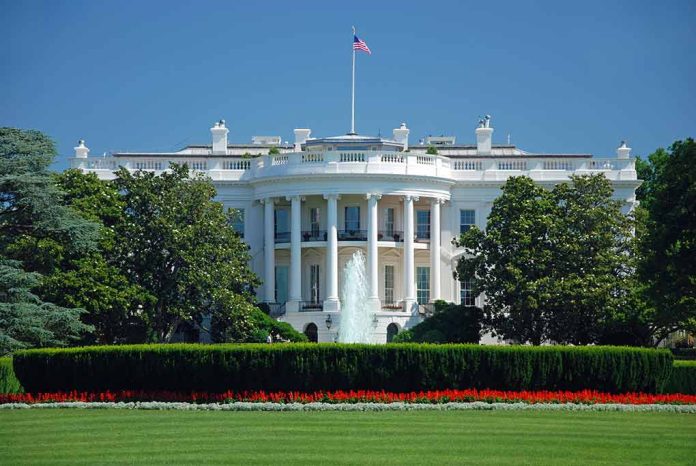
Amazon’s proposed strategy to pass tariff costs onto consumers and vendors sparks fierce debate over corporate ethics and economic impact.
Key Takeaways
- Amazon considered, then denied, plans to show tariffs on products.
- President Trump viewed the consideration as a “hostile” act by Amazon.
- Amazon’s share price dropped by 1% after the news broke.
- Senate Minority Leader Chuck Schumer encouraged transparency on tariff impacts.
- Amazon claims the idea was never meant for its main site.
Tariff Considerations and the Response
Amazon, facing mounting trade expenses, considered revealing tariff costs on its platform, a move sharply criticized. The White House called it “hostile and political,” reflecting tension over corporate strategies amid rising tariffs on imports. The proposal, which included displaying these costs on the “Amazon Haul” store, was not implemented. “This is a hostile and political act by Amazon,” Press Secretary Karoline Leavitt said. “Why didn’t Amazon do this when the Biden administration hiked inflation to the highest level in 40 years?” Critics argue that consumers and small vendors would bear the brunt of such transparency, impacting their finances severely.
After discussions and subsequent opposition from President Trump, Amazon opted against showcasing these surtaxes publicly. Historically, the relationship between Bezos and Trump has been complex, with Bezos making overtures toward Trump’s administration. However, the potential increase in transparency was seen as contentious, prompting direct intervention from President Trump.
The Broader Trade and Political Landscape
Reports indicate nearly 1,000 products on Amazon experienced price hikes due to tariffs, averaging a 30% increase. Comparatively, other online retailers, including Shein and Temu, have also adjusted pricing due to similar pressures. Chuck Schumer has advocated for greater transparency in tariff impacts, stating, “People deserve to know the impact tariffs have on their finances.” Moreover, tensions were compounded when Karoline Leavitt criticized Amazon’s timing and motives, which she described as reactive to political pressures.
Other global e-commerce brands are adapting differently: while facing tariffs, companies like Temu are openly displaying import charges at checkout. Amazon’s share value decreased by approximately 1% following these controversies. The debate surrounding Amazon’s initial consideration of tariff transparency reflects broader political challenges and economic pressures in navigating rising costs.
Corporate Dynamics Amid Trade Tensions
As supply chain issues and tariff implications stir debates, Amazon’s executive decisions remain under scrutiny. Although Bezos has shown support for Trump in the past, including philanthropic gestures towards his administration, the notion of displaying tariffs led to significant backlash. Treasury Secretary Scott Bessent applauded Trump’s economic policies as mitigating inflation, yet the discussion on consumer transparency persists.
Moving forward, the potential for easing tariffs with China brings some hope for reduced tensions. Trump announced intentions to potentially lower tariffs contingent upon negotiations, signaling possible improvements in international trade relations. Until then, businesses like Amazon face ongoing pressure to balance transparency and competitive pricing with economic feasibility and regulatory compliance.
Amazon's plan to show the extra cost of goods due to tariffs is a "hostile act," Trump's spokeswoman said. Amazon shares in response: pic.twitter.com/9tN4Fjelpm
— Lisa Abramowicz (@lisaabramowicz1) April 29, 2025
Sources:
- Trump called Jeff Bezos after learning Amazon considered breaking out a tariff charge
- Furious Trump calls Jeff Bezos over ‘politically hostile’ Amazon plan to advertise tariff surcharge on goods
- Amazon denies tariff pricing plan after White House calls it “hostile and political”
- Amazon Reportedly Floats Plan To Show Tariff Price Increases To Shoppers — Karoline Leavitt Calls It ‘Hostile’ Move | The Daily Caller



